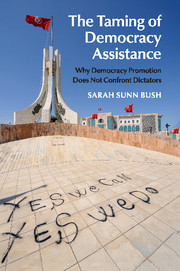Description
The Taming of Democracy Assistance
Why Democracy Promotion Does Not Confront Dictators
Author: Bush Sarah Sunn
Most government programs seeking to aid democracy abroad do not directly confront dictators. This book explains how organizational politics 'tamed' democracy assistance.
Language: English
Subject for The Taming of Democracy Assistance:
Approximative price 32.87 €
In Print (Delivery period: 14 days).
Add to cart
The Taming of Democracy Assistance
Publication date: 11-2016
Support: Print on demand
Publication date: 11-2016
Support: Print on demand
Approximative price 101.82 €
In Print (Delivery period: 14 days).
Add to cart
The Taming of Democracy Assistance
Publication date: 04-2015
288 p. · 15.2x22.9 cm · Hardback
Publication date: 04-2015
288 p. · 15.2x22.9 cm · Hardback
Description
/li>Contents
/li>Biography
/li>
Few government programs that aid democracy abroad today seek to foster regime change. Technical programs that do not confront dictators are more common than the aid to dissidents and political parties that once dominated the field. What explains this 'taming' of democracy assistance? This book offers the first analysis of that puzzle. In contrast to previous research on democracy aid, it focuses on the survival instincts of the non-governmental organizations (NGOs) that design and implement democracy assistance. To survive, Sarah Bush argues that NGOs seek out tamer types of aid, especially as they become more professional. Diverse evidence - including three decades of new project-level data, case studies of democracy assistance in Jordan and Tunisia, and primary documents gathered from NGO archives - supports the argument. This book provides new understanding of foreign influence and moral actors in world politics, with policy implications for democracy in the Middle East.
Part I. Introduction and Argument: 1. Introduction; 2. The argument: structure, agency, and democracy promotion; 3. Tame democracy assistance: what it is and why it matters; Part II. Testing the Argument: 4. Delegation and the allocation of democracy assistance; 5. Changes in American grant-making; 6. Creating the democracy establishment; 7. Jordan: aid in the shadow of geopolitics; 8. Tunisia: reform after revolution; Part III. Conclusions: 9. Should democracy promoters be set free?; Part IV. Appendices and References: A. Descriptions of categories of democracy assistance; B. List of interviewee affiliations; C. Major organizations in the democracy establishment; D. Data appendix.
Sarah Sunn Bush is an Assistant Professor in the Department of Political Science at Temple University, Philadelphia and a Senior Fellow at the Foreign Policy Research Institute. Her research focuses on democracy promotion, non-state actors in world politics, and gender and human rights policy, and has been published in several journals, including International Organization and International Studies Quarterly. Dr Bush was the 2014 winner of the Deborah Gerner Grant for Professional Development.
© 2024 LAVOISIER S.A.S.




